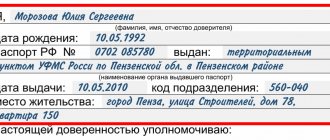General power of attorney for an apartment
In accordance with civil legislation (Article 185.1 of the Civil Code of the Russian Federation), notarization requires a power of attorney for concluding transactions that require a notarized form of certification, or actions that involve making changes to state registers. Since all rights to real estate are recorded in the state register of rights to real estate, the general power of attorney in question must be drawn up in notarial form.
When drawing up such a power of attorney, the principal must understand the consequences of his actions. By issuing a general power of attorney for an apartment, you give a third party the right to dispose of your real estate at their own discretion on completely legal grounds.
The only restriction on alienation rights is a gift transaction.
You can donate your apartment (or other real estate) only if you explicitly provide in the power of attorney not only the right of donation, but also the name of the recipient. Well, of course, a trustee also cannot bequeath real estate on your behalf, since a will is always drawn up in the presence of the testator and personally signed by him (with the exception of cases with hands). In this case, the authorized person can exchange, sell, lease (hire), pledge, register any changes with government agencies, and sign all documents necessary to complete such transactions.
Procedure for registration and cancellation of a power of attorney
To issue a general power of attorney, the principal must contact any notary and have with him a passport, a certificate of ownership of the apartment (or other real estate), a document confirming the grounds for the transfer of ownership rights to you (sales agreement, deed of gift, certificate of inheritance ), as well as a copy of the passport or passport details of the authorized representative.
If the power of attorney provides for the right to make a gift, then passport data and the full name of the donee are also required. Depending on each individual case, the notary may request other documents. You should also understand the procedure for revoking such a power of attorney. The fact is that in the event of cancellation of the power of attorney, the principal must notify not only the authorized person, but also all third parties known to him who have entered into legal relations with the representative. In the case of a general power of attorney, it can be problematic to comply with this condition.
Notaries recommend not issuing this type of power of attorney. It is better to directly indicate the rights that the principal must perform in order to avoid unpleasant surprises in the future. And as judicial practice shows, such an opinion is not unfounded.
What is this document and why is it needed?
Indeed, why do you need a special power of attorney?
In accordance with current legislation, enterprises that authorize their employees to receive certain inventory items are required to issue a power of attorney for them. Typically, the source of receipt of goods and inventory items is their purchase from the supplier, with whom the corresponding agreement has been concluded. All inventory items issued under a work order, invoice, contract, order or agreement require a power of attorney. In order to fulfill the obligation under the contract, it is necessary to transfer goods and materials, which become the property of the buyer. This can only be done by an individual, to whom the company issues a power of attorney to receive it.
https://www.youtube.com/watch?v=3KhrxORE4Lg
Let's figure out what kind of document this is. A power of attorney is a special document that is designed to confirm the rights and obligations of the parties. It is issued by one person in the name of another and allows the latter to represent interests before third parties. Thus, the power of attorney of the enterprise is issued to the employee, who will receive the goods and materials from the supplier.
As a general rule, there are several types of powers of attorney: general, special or one-time.
As for the power of attorney to receive goods and materials, it is classified as a special type, since it authorizes the performance of a number of homogeneous actions - receiving goods from the supplier. Its main purpose, as a legal act, is to confirm the powers of the trustee to a third party.
This act necessarily records the rights and obligations that the trustee has. Clearly defined rights and responsibilities allow you to avoid unlawful actions on the part of the employee to whom this power of attorney is issued.
All actions provided for by it are exclusively legal. Simply put, without it you cannot obtain inventory items.
For what period is a general power of attorney issued?
The validity period of the general power of attorney is determined in accordance with the provisions of Art.
186 Civil Code. This is a general rule that governs the duration of any power of attorney. The law does not provide for requirements for the minimum and maximum validity periods of a document. The previously existing limitation of the power of attorney term of 3 years was abolished back in 2013 by the Law “On Amendments...” dated 05/07/2013 No. 100-FZ.
When issuing a power of attorney, it is not necessary to indicate the validity period of the document. If it is not specified, the power of attorney will be valid for exactly 1 year from the date of issue. If you directly indicate a different period—more or less—then the power of attorney will be valid until that time expires.
An important requirement for a power of attorney is the need to indicate the date of its preparation. Otherwise, the document is considered void and does not entail any legal consequences. Specifying the date allows you to determine the beginning of the power of attorney.
Approximate contents of a power of attorney for the sale, rental and other actions with the apartment
Now let's look at the approximate structure of a notarized power of attorney and its content.
- At the very top, the name of the document (“Power of Attorney”), the place of its issue and the date are indicated. By the way, the date of issue of the power of attorney is a prerequisite for its validity.
- This is followed by the surname, name and patronymic of the principal, indication of citizenship, date and place of birth, his full passport data, information about the authority that issued the document, and address of residence. This is followed by information about your real estate. For example, the address of the location of the apartment, its area, number and date of issue of the certificate of ownership, the basis for acquiring the right.
- Similar information about the trustee is provided below. It is important to say that one power of attorney may indicate several representatives. In this case, everyone can be granted both an individual scope of rights and all the rights specified in the power of attorney.
- The following is information about the order that you trust to be carried out on your behalf. In our case, this means carrying out any transactions with the specified real estate, including alienation by any method not prohibited by law and rental. To do this, the representative is delegated the authority to submit and receive any documents, including certificates, extracts, statements, explanations, and sign all documents necessary for the proper execution of the specified order. As well as representing your interests in all state and non-state bodies or before individuals on issues related to the assignment.
- The following are indicated: the validity period of the power of attorney, an indication of the possibility of reassignment (or the lack of such a possibility), and you confirm that the consequences of issuing the power of attorney and the provisions of the law on powers of attorney have been explained to you. Then the personal signature of the person who issued the power of attorney is affixed.
- After all of the above, the notary’s details are indicated and his personal signature is affixed. With his signature, the notary confirms that the power of attorney was made in his presence, he verified your identity and legal capacity. The number of the power of attorney in the register and information about the amount collected for services are also indicated.
What risks does a general power of attorney pose for the parties?
A general or general power of attorney for real estate assigns to the trustee the maximum number of rights, in particular the right to dispose of real estate belonging to the principal.
In practice, this means that the representative at any time (during the period of validity of the power of attorney) can make almost any transaction on behalf of the owner. Concluding transactions under a general power of attorney carries certain risks both for the owner of the property and for the other party:
- The representative may perform actions with the real estate of the represented person, which the latter may not know about and may not even imagine the possibility of their commission. The transactions concluded by the representative will have to be contested, and this leads to problems both for the person who issued the power of attorney and for the new owner of the property. Therefore, you should not issue general powers of attorney to unfamiliar or untrustworthy people.
- If the power of attorney is revoked, the representative does not have the right to enter into transactions with the property of the former represented person. However, there are situations when the bona fide party to the transaction does not know that the power of attorney has expired. If such a transaction is completed, it may be declared invalid. Therefore, if the seller’s representative acts on the basis of a general power of attorney when concluding a transaction, it is better for the buyer to verify with any notary that the document has not been revoked. Recognizing the transaction as invalid entails the return of the parties to the original position - the seller must return the money, and the buyer is deprived of his rights to the property. However, if the seller refuses to return the money, then collecting it from him will be problematic.
- A representative may make a transaction on terms that are not favorable to the represented person. A general power of attorney, as a rule, does not indicate specific conditions for the disposal of real estate, which may contribute to this. For example, a representative sells an object for less than the owner wanted when drawing up a power of attorney. The trustee’s fulfillment of other verbally agreed (or not agreed upon at all) conditions is not guaranteed. In order to avoid such problems, it is preferable to indicate in the document a list of specific actions that the representative has the right to perform on behalf of the principal.
***
Thus, a general power of attorney can be issued only when the owner of the property knows the representative well and trusts him. Otherwise, it is better to issue a power of attorney only to perform specific actions, for example, to sell a certain apartment for a pre-agreed price.
What types of powers of attorney are there?
You can fill out a power of attorney to receive goods in the free and unified M-2 form. Regardless of the option you choose, notarization of the document is not required. For a document to have official status and legal force, it must have appropriate records.
The document can be issued to third parties for shipment/transportation of products, as well as presented at the place of request.
It is better to draw up a power of attorney from a legal entity in the unified form M-2. A free version of the document is not prohibited, but with all the details of the parties indicated.
Note!
Regardless of the form of the document, it must contain a date, in the absence of which the power of attorney is considered void and does not entail the rights/responsibilities of the parties.
As an official document, it has several types. The choice of a specific one depends on the purpose and determines the powers of the trustee:
Short term
Such a power of attorney is issued for several days in case of a specific action - transfer, receipt of goods, delivery of cargo, etc.
Regular
For regular actions, the authorized person receives a special document for the period established by the agreement - receiving money from the bank by check, transferring goods and materials to the counterparty, etc.
General
Such a power of attorney to receive products is distinguished by increased powers, for example, concluding contracts, selling property, etc.
In the absence of this clause, the validity period is considered to be 12 months.






